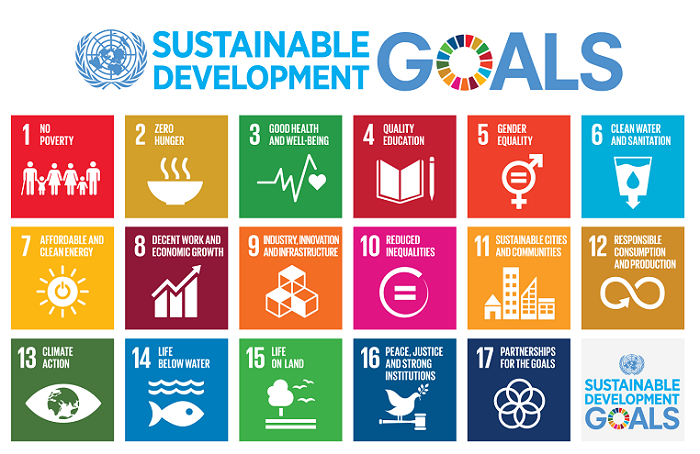What are the SDGs?
The Sustainable Development Goals (SDGs) are 17 global goals developed for the United Nations’ 2030 Agenda for Sustainable Development. Embracing a wide range of environmental, social and economic issues, these 17 goals with their 169 associated targets aim to connect business strategies to global priorities for people and the planet.
What do they mean for the Hospitality Industry?
In 2015 UNWTO (UN’s World Tourism Organisation) translated the SDGs into specific actions for the tourism sector. UNWTO noted Goals 8, 12 and 14 as those most related to activities stemming from the tourism sector. The goals address inclusive and sustainable economic growth, sustainable consumption as well as production (SCP) and the sustainable use of oceans and marine resources, respectively.
The International Tourism Partnership (ITP) already launched a set of goals in 2017 to be aligned with the UN’s SDGs. The goals address 4 topics including Youth employment, Carbon, Water and Human Rights that align with SDGs 4, 6, 8, 10 and 13. ITP’s Goals send a clear call to action to the wider industry on the critical importance of using the SDGs as a focal point to drive responsible business in hospitality. ITP’s research indicates that the hotel industry must reduce its absolute carbon emissions by 66% by 2030 and 90% by 2050 to stay within the two degrees threshold of the COP21 Paris Climate Agreement; this is a quantifiable ‘scientific based target’.
2017 was the International Year of Sustainable Tourism for Development: #travelenjoyrespect. This focus (designated by the UN) aimed to support a change in policies, business practices and consumer behaviour towards a more sustainable tourism sector that can contribute to the SDGs.
In 2018 UNWTO released the Tourism for SDGs platform to provide the Tourism and Hospitality sector with a wide range of resources and to encourage them to share best practice on the SDGs.
Examples of global Hotel Groups addressing the SDGs include: Marriott, Oetker Collection, IHG, Accor Hotels & Meliá Hotels
In August of this year, the World Travel & Tourism Council (WTTC) signed up to the UN’s Climate Neutral Now initiative, with a pledge to measure, reduce & offset greenhouse gas emissions in line with SDG13. The role of hotels & tourism in tackling climate change is being showcased at the ongoing COP24 Climate Conference in Katowice, Poland this week.
What are the challenges with the implementation of the SDGs?
The Cambridge Institute for Sustainability Leadership identified the following Challenges:
1) businesses still need a compelling business narrative and systematic approach to integrate SDGs into business operations.
2) Currently SDGs are being cherry-picked; however all goals should be holistically integrated in to a business approach in order to be effective (Towards a Sustainable Company, 2017).
Hospitality businesses are starting to integrate the SDGs into their most recent strategies; however there is still no concise, consistent and comparable way to track & monitor their progress in achieving the goals. The SDGs Compass was developed in 2018 by the GRI, United Nations Global Compact and WBCSD to support companies in aligning their strategies with the SDGs and in measuring and managing their contribution.
SDGs are being approached at macroscopic level rather than in granularity by referring to the 169 targets.
Achieving the SDG agenda requires a clear implementation framework, adequate financing and investment in technology, infrastructure and human resources from hospitality businesses.
What are the benefits, for a hospitality business, of addressing the SDGs?
| Department | Benefit |
| Marketing & Communications | Enhance brand name
Better market standing Increased transparency Address global trends – accommodation performs better in ratings (e.g. TripAdvisor) by addressing sustainability agenda |
| Procurement | Form new partnerships to build stronger relationships in important markets
New products – increased innovation Reduce waste |
| Operations | Operational efficiencies
Informed decisions Cost savings |
| Finance | Cost savings
Increase ROI Strengthen investor confidence and competitiveness |
| Administration/Management | Stakeholders engagement – improved relationships with social and regulatory stakeholders
Protecting longevity of industry by protecting natural & cultural heritage as well as natural and human resources Manage risks e.g. climate change |
| Human Resources | Drive fundamental internal changes in culture and structure
Furthers Gender Equality which leads to more balanced companies Increased employee engagement and satisfaction = reduced turnover |
What is the Considerate SDGs Toolkit?
A toolkit to assist our hotel members to implement and monitor the SDGs within a hospitality business. The toolkit is divided into four parts:
Part 1: SDGs 1 to 4
Part 2: SDGs 5 to 8
Part 3: SDGs 9 to 12
Part 4: SDGs 13 to 17
Part 1 will be sent to our hotel members today. Not a member but would like to know more? Please get in touch.



